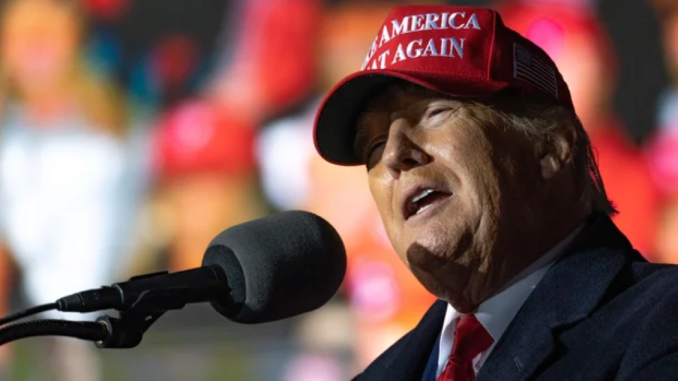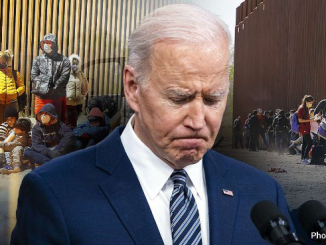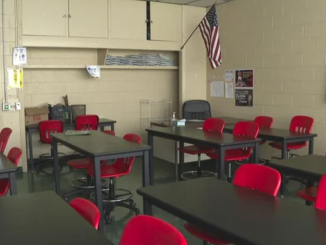
The former president’s level of intervention in the swing state’s elections is unmatched anywhere else.
LANSING, Mich. — At a “MAGA mixer” in a banquet hall upstairs from a bowling alley on Saturday night, a room full of Michigan Republicans erupted in applause when a state House candidate said protesting outside the U.S. Capitol on Jan. 6 — and getting tear-gassed — was a “highlight of my life.”
They nodded knowingly when a state Senate candidate — who drew controversy at a previous event for telling Republicans to “show up armed” to monitor ballot counting — said he’d decided this time not to have his campaign livestream his remarks.
“Everybody in this room,” said Mick Bricker, another legislative candidate, “is running to oppose the RINOs who have taken over our House and Senate in this great state of Michigan.”
The three candidates, all of them endorsed by Donald Trump, are part of a great experiment currently taking place here. Of all the states where the former president and his allies are purging the GOP of traditionalist conservatives, Michigan has emerged as perhaps MAGA’s most critical proving ground, a place where Trump’s level of intervention up and down the ballot is unmatched.
His success — or failure — in electing his unofficial slate will serve as a measure of his clout within the GOP. But it will also signal whether he has rehabilitated his standing in a key battleground — one of the five states that flipped to Joe Biden in 2020.
“Obviously he sees the importance of Michigan as a swing state,” said Matt Marko, president of suburban Detroit’s North Oakland Republican Club, said after a candidate debate last week. “He’s trying to maintain his support.”
In Michigan, Trump has already endorsed 10 state legislative candidates, far more than in any other state. He has chosen sides in close to a half-dozen congressional races — including against the two House GOP incumbents who voted for his impeachment — and endorsed candidates for two statewide offices.
Late last month, Trump penned a letter to state party delegates on behalf of a candidate for attorney general.
His commitment to remake the state’s political order has not been lost on his supporters. Borrowing a page from single-issue advocacy groups, they are pressing candidates to answer a questionnaire that prompts them, among other questions, to “define a RINO” and say if elected officials should be “replaced for ignoring evidence of fraud.”
Trump will appear at a rally in the state on Saturday.
Following her speech at the “MAGA mixer,” Angela Rigas, the candidate proud of protesting at the Capitol (she said she did not go inside) said. “The grassroots is actually going to take back Michigan.”
If something close to that happens, it will mark a severe turn away from establishment Republican politics in one of the few states where, right after the 2020 election, the traditionalist wing of the party appeared to still have life.
It was a Republican member of the Michigan state board of canvassers who voted to certify Biden’s victory in the state, and it was GOP lawmakers here who told Trump he had no post-election path to overturn the results — and later reported finding no evidence of widespread fraud. Of the 10 House Republicans who voted for Trump’s impeachment, two were from Michigan.
Trump, at a recent fundraiser, described the state as a “laggard” in his election conspiracy crusade.
But even the old guard can see the MAGA-fication of Michigan may be unavoidable this year.
In the Michigan Republican Party of 2022, said Jason Watts, who was removed from his post as a local party treasurer in Michigan after publicly breaking with Trump, “The inmates are running the asylum.”
Trump’s advisers have maintained he is focused on the midterm elections. And his planned rally in Macomb County will come just weeks ahead of a critical state GOP endorsement convention.
Yet for Trump and his allies, the former president’s midterm intervention in Michigan is also part score-settling and preparation for 2024.
If Trump runs again — and, crucially, if he loses and contests the outcome — it will help him to have followers in positions of power. Already, his preferred candidates are mainstreaming baseless claims about voter fraud in Republican nominating contests, reshaping the party while risking turning off moderate voters in the general election in the fall.
Former President Donald Trump speaks to the crowd during a rally at the Florence Regional Airport on March 12, 2022 in Florence, South Carolina. | Sean Rayford/Getty Images
Trump’s choice for attorney general, Matthew DePerno, is a Kalamazoo lawyer who was a major figure in Trump’s failed bid to overturn the election in Michigan. John Gibbs, the candidate Trump has endorsed in the race against U.S. Rep. Peter Meijer, a Republican who voted for Trump’s impeachment, is a former Trump administration staffer. And the former president’s preferred state legislative candidates might as well have been.
They include one state House contender who describes himself as “Trump’s guy in West Michigan” and another who proclaims that “any GOP candidate who says to ‘move on’ [from 2020] is not on our side.”
At the “MAGA mixer,” where speakers warned of the “Marxist takeover of your government” and the “corrupt political elite,” Kristina Karamo, the Trump-endorsed candidate for Michigan secretary of state, asked, “What good is it to have a Republican if they’re only going to be co-conspirators with Democrats?”
Amid cheers, a man in the audience called out, “Amen.”
Of all the swing states that Trump lost in 2020, Michigan, which Biden carried by nearly 3 percentage points, was not particularly close. Trump lost by narrower margins in Wisconsin, Arizona, Georgia and Pennsylvania.
Still, the state is significant enough to Trump that his advisers have polled a potential rematch with Biden in Michigan.
State Rep. Matt Maddock, who has Trump’s endorsement and is vying to become speaker of the state House, was one of Trump’s earliest supporters in the state. His wife, Meshawn Maddock, is a Trump ally and co-chair of the state party. Trump made clear his goal for the statehouse last year, when he wrote of the Republican-controlled legislature, “Michigan needs a new legislature. The cowards there now are too spineless to investigate Election Fraud.”
With no high-profile Senate race in the state this year, said Saul Anuzis, a former chair of the Michigan Republican Party, at a minimum Trump’s involvement in local contests “allows him to say that he’s doing state legislative races, that he’s focused on winning Republican seats up and down the ticket, which I think is a good thing.”
He said, “Michigan’s one of the places he can showcase checking that box.”
It is not clear, despite the GOP’s fealty to Trump today, that he has been especially good for the Republican Party in Michigan. He drew about 370,000 more votes in the state in his losing effort in 2020 than he did in 2016. But Republicans during his presidency lost the governor’s mansion and the offices of the attorney general and secretary of state, as well as majorities on the state Board of Education and state Supreme Court.
Yet for Trump, the fallout of Republicans losing elections is that, unlike in Georgia or Arizona, where he is feuding with incumbent Republican governors, the landscape in Michigan is much clearer for him.
“We don’t have a strong Republican political infrastructure here to stand up to him, or to compete with his influence over the grassroots,” said Jason Roe, the state party’s former executive director. “It’s a no-man’s land. And you know, in the land of the blind, the one-eyed man is king.”
The base’s devotion to Trump was on display at a small rally in blistering cold at the state capitol building on Saturday, where “Trump won” was emblazoned on a flag and where a woman held a sign demanding a “full forensic audit.” Also in attendance was Arizona state Rep. Mark Finchem, a leading proponent of the conspiracy-tinged vote audit in Arizona’s largest county.
Now a Trump-endorsed candidate for secretary of state, Finchem told rallygoers, “The time for the establishment status quo has come and gone.”
But nowhere was Michigan Republicans’ acquiescence to Trump more evident than at a fundraiser this month for DePerno at Mar-a-Lago. The event, at which DePerno referred to Trump as “the greatest president in modern history,” drew Michigan candidates running for governor, secretary of state and the U.S. House, according to a video posted on social media.
Clamoring to get on stage with the former president, one gubernatorial hopeful held up by security called out, “I’m running for governor, too … Can I come up?”
For the purposes of the Republican nomination, Trump is a boon to any Republican. But as in other states, there is a political risk to the party’s Trumpification. While Trump remains popular among the GOP base, he is far less so among independents and voters who describe themselves only as “lean Republican,” according to a Detroit News/WDIV poll earlier this year. His overall favorability rating in the state has sunk to about 31 percent.
Following an attorney general debate at which old grievances about voter fraud competed for time with complaints about Democratic officials’ handling of the coronavirus pandemic, among other issues, Michigan state Sen. Jim Runestad, who was in the audience, said Republicans would likely make a “more impactful” case in the general election if they focused on the latter.
John Engler, a former three-term Michigan governor, said the same. In a midterm election year with an unpopular president in which Republicans are poised to make widespread gains, Republicans, he said, “could easily miss the opportunity.”
“This is going to be a big year for Republicans, and the only way it won’t be is if we nominate candidates who are looking back, not forward,” he said.
He said Trump is “endorsing a lot of candidates who I think are going to lose.”
*story by Politico


